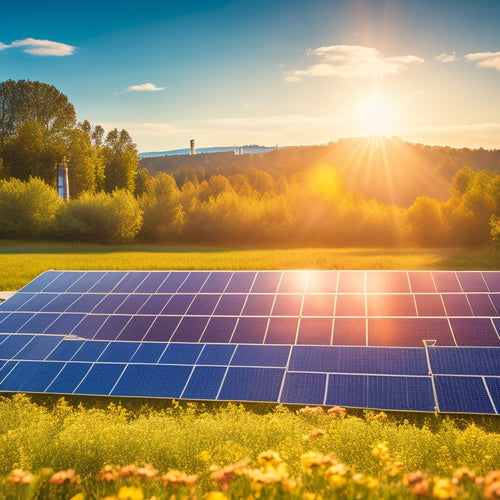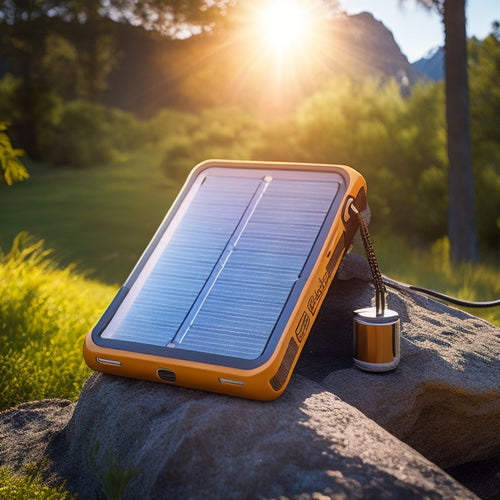
Residential Solar Kits
Share
You're considering residential solar kits to utilize renewable energy, reduce your reliance on utility companies, and save money on energy bills. With government incentives like federal tax credits and streamlined permitting, you can offset the upfront costs. High-efficiency solar cells can eliminate energy bills entirely, and understanding cell efficiency ratings will help you make an informed decision. Before installation, assess your roof's shading patterns to maximize energy production, and look for systems with longer lifespans guaranteed by extended warranty options. Now, you're one step closer to utilizing the power of solar energy - and there's more to investigate.
The Essentials
- Residential solar kits can eliminate energy bills entirely, reducing reliance on utility companies and redirecting savings towards other expenses.
- Federal and state incentives, such as tax credits and rebates, can significantly reduce the upfront cost of residential solar kits.
- Higher-efficiency solar panels yield more electricity per unit area, but often come at a higher cost, requiring informed decision-making.
- A thorough roof assessment is crucial for optimal energy production, considering factors like shading patterns, roof design, and energy audits.
- System longevity and warranty options, including extended warranties and service agreements, provide assurance for residential solar kit investments.
Government Incentives Available
You're likely aware that investing in a residential solar kit can be costly, but you'll be pleased to know that government incentives can help offset the expense.
Furthermore, with a reliable solar panel and battery kit, you can guarantee a backup power source during frequent outages, assuring that essential appliances and devices remain functional Renewable Energy Systems.
The federal government offers a tax credit of up to 26% of the total system cost, and you can claim it on your taxes.
Additionally, you may be eligible for state and local incentives, such as rebates, tax credits, or property tax exemptions, which can further reduce the upfront cost of your solar kit.
Federal Tax Credit
Take advantage of the Federal Tax Credit, a government incentive that slashes your residential solar kit installation costs. As a homeowner, you're eligible for this credit if you own your solar panel system and have taxable income.
By embracing renewable energy solutions, you're not only reducing your carbon footprint but also contributing to a healthier environment for future generations Sustainable Power. The credit amount is 26% of the total cost of your solar kit, including installation.
To claim the credit, you'll need to file IRS Form 5695 with your tax return. Be sure to keep receipts and invoices for your solar kit purchase, as you'll need these to calculate the credit amount.
To determine your tax credit eligibility, review the solar kit manufacturer's certification stating that the equipment meets the necessary standards. You can find this certification on the manufacturer's website or in the product documentation.
When filing your taxes, complete Form 5695 and attach it to your Form 1040. Follow the instructions carefully, as incorrect filing can delay your refund.
State and Local
In addition to the Federal Tax Credit, various state and local governments offer incentives to encourage the adoption of residential solar kits. You'll find that these incentives vary widely depending on where you live. Some states offer rebates or tax credits, while others provide exemptions from sales or property taxes.
With the increasing demand for energy independence, many governments are now offering more attractive incentives to homeowners who invest in renewable energy solutions. You may even find that your local government has its own set of incentives, such as streamlined permitting processes or waived fees for residential solar installations.
When researching state and local incentives, be sure to familiarize yourself with the state regulations and local permits required for residential solar installations in your area. You may need to obtain a permit from your local government or meet specific standards set by your state's energy department.
Additionally, some states have net metering laws that allow you to sell excess energy back to the grid, which can help offset the cost of your solar kit. By taking advantage of these state and local incentives, you can further reduce the upfront cost of your residential solar kit and start enjoying the benefits of clean, renewable energy.
Zero Energy Bills
You're likely considering a residential solar kit to achieve energy independence, and that means saying goodbye to hefty electricity bills.
With a well-designed system, you can generate enough power to offset your energy consumption, effectively zeroing out your expenses.
By incorporating photovoltaic cells into your residential solar kit, you'll be able to convert sunlight into usable energy.
Additionally, a focus on energy efficiency will guarantee your system operates at its best.
Energy Independence Now
By going off the grid with residential solar kits, homeowners can achieve energy independence now, effectively eliminating their reliance on utility companies and, consequently, their energy bills. With the current solar energy trends, it's clear that renewable energy technologies are becoming increasingly efficient and affordable.
| Benefits | Features | Results |
|---|---|---|
| Reduced Carbon Footprint | High-efficiency solar panels | Zero energy bills |
| Energy Independence | Smart inverter technology | Reduced reliance on utility companies |
| Increased Property Value | Durable and long-lasting equipment | Increased energy self-sufficiency |
| Low Maintenance | Advanced monitoring systems | Reduced energy expenses |
| Government Incentives | Certified installation partners | Increased energy independence |
Zero Out Expenses
Most homeowners who switch to residential solar kits can eliminate their energy bills entirely, freeing up a substantial portion of their monthly budget.
You'll no longer be at the mercy of utility companies or subject to rate hikes. With solar, you're in control. By utilizing the power of the sun, you'll generate electricity and reduce your reliance on the grid.
The installation process typically takes a few days to a few weeks, depending on the complexity of the project.
Once installed, your solar panels require minimal maintenance – just occasional cleaning to guarantee peak performance.
You'll be surprised at how seamlessly solar energy integrates into your daily life. As you zero out your energy expenses, you'll enjoy the freedom to allocate that money towards more meaningful pursuits.
Imagine having extra funds for travel, education, or simply enjoying life's little luxuries. With residential solar kits, that's exactly what you'll get.
High-Efficiency Solar Cells
You're likely familiar with the importance of high-efficiency solar cells in residential solar kits.
When selecting solar cells, you'll want to take into account cell efficiency ratings, which measure the percentage of sunlight converted into electricity.
High-efficiency solar cells are designed to provide peak power output, and top rated solar panels for homes can greatly minimize electricity bills.
Look for cells with high max power output to guarantee your system generates the most energy possible.
Cell Efficiency Ratings
When shopping for residential solar kits, homeowners often find themselves maneuvering through a sea of technical specifications, with cell efficiency ratings being a crucial aspect to take into account. You want to verify that the solar panels you choose can convert sunlight into electricity efficiently.
Cell efficiency ratings measure how well a solar panel can convert sunlight into electrical energy. You'll come across different solar cell technologies, each with its own performance characteristics. Monocrystalline silicon cells, for instance, are known for their high efficiency, usually above 20%.
Polycrystalline silicon cells, on the other hand, have lower efficiency ratings, typically ranging from 15% to 18%. Thin-film solar cells have the lowest efficiency ratings, usually below 15%.
When comparing the performance of different solar panels, you'll want to factor in the cell efficiency rating. A higher rating means more electricity generated per unit area. However, it's important to note that higher-efficiency panels often come with a higher price tag.
You'll need to weigh the benefits of higher efficiency against the added cost. By understanding cell efficiency ratings, you can make an informed decision when selecting the right residential solar kit for your needs.
Max Power Output
As you weigh the benefits of higher-efficiency solar panels, it's equally important to deliberate their maximum power output. This is where the actual energy conversion rates come into play. You'll want to assess the maximum power output in watts (W) to guarantee your residential solar kit meets your energy needs.
High-efficiency solar cells boast higher solar panel efficiency, which translates to more electricity generated per unit area. For instance, a 400W solar panel with 22% efficiency will produce more power than a 350W panel with 18% efficiency.
When evaluating max power output, look for the maximum power point (MPP) rating, which is the highest power output a panel can produce under standard test conditions. A higher MPP rating means more energy for your home.
Be sure to check the temperature coefficient rating as well, as it affects the panel's performance in real-world conditions. By assessing max power output, you'll be able to optimize your residential solar kit for maximum energy independence.
Check Your Roof's Shading
You'll need to assess your roof's shading to maximize your solar kit's energy output.
Consider obstructions like skylights, vents, and chimneys, as well as nearby trees or buildings that may cast shade on your roof.
Performing an energy audit can help identify areas of inefficiency and provide a clearer understanding of your energy needs.
Roof Obstructions to Consider
Before installing a residential solar kit, assess your roof's shading by identifying potential obstructions that could hinder your solar panels' energy production.
You'll want to examine your roof's design, considering features like chimneys, vents, skylights, and dormer windows that could cast shadows on your solar panels. Take note of nearby trees or buildings that could also obstruct sunlight.
Next, evaluate your roof's pitch and installation orientation. A south-facing roof with a pitch between 15 and 40 degrees is ideal for solar panel installation.
However, if your roof has a different orientation or pitch, you can still install solar panels, but you may need to adjust the installation angle or use specialized mounting systems.
Be aware that obstructions can reduce your solar panels' energy output, so it's crucial to carefully assess your roof's conditions before installing a residential solar kit.
Shading Patterns Over Time
Evaluating your roof's shading patterns over time is vital to guarantee best energy production from your residential solar kit.
As you reflect on the installation of solar panels, it's important to assess how shading will impact your system's performance. You'll want to identify any obstructions that could cast shade on your panels, including trees, buildings, and other roof features.
Seasonal shading is a significant factor to weigh, as the sun's position changes throughout the year. For example, trees that provide shade in the summer may not be an issue in the winter.
You'll need to determine the best solar panel orientation to maximize energy production, keeping in mind any seasonal shading patterns. A south-facing orientation is generally best, but this may not be possible if your roof is partially shaded.
Longer System Lifespan Guaranteed
You're likely looking for ways to guarantee your residential solar kit lasts as long as possible.
One key factor is the warranty, and you'll be pleased to know that many manufacturers offer extended warranty options.
These options can provide you with added peace of mind, ensuring a longer system lifespan and protecting your investment.
Extended Warranty Options
With a residential solar kit, you're making a significant investment in your home's energy independence, and naturally, you want to guarantee it lasts for years to come.
Extended warranty options provide you with the assurance that your system will continue to perform at its best, even beyond the standard warranty period. These options typically include thorough warranty coverage that protects you against manufacturing defects, material failures, and workmanship issues.
You can choose from various service agreements that cater to your specific needs and budget. For instance, you can opt for a 10-year or 20-year extended warranty, which covers parts and labor costs for repairs and replacements.
Some providers even offer premium warranties that include priority customer support, regular system inspections, and maintenance services.
Frequently Asked Questions
Can I Install Residential Solar Kits Myself?
You can attempt a DIY installation, but it's essential you take necessary safety precautions to avoid electrical shock, falls, and other hazards, ensuring a safe and successful process that meets local building codes and regulations.
How Do I Clean and Maintain Solar Panels?
Did you know 98% of solar panel owners report minimal maintenance? You'll be part of that group by using gentle cleaning techniques, like soft-bristled brushes and distilled water, for effective solar panel maintenance that keeps your energy output shining bright!
Will Solar Panels Affect My Roof's Warranty?
When you install solar panels, you'll need to take into account roof warranty implications; improper installation can void your warranty, so make certain your installer follows manufacturer guidelines and local building codes to avoid any potential issues.
Can I Add More Panels to My Existing System?
You can expand your existing system by adding more panels, but guarantee compatibility by checking the inverter's capacity and panel specifications to determine viable expansion options that won't void your warranty or compromise performance.
Do Solar Panels Work During Power Outages?
Like a shipwrecked sailor spotting a lighthouse, you're seeking refuge from power outages. During outages, your solar panels won't power your home unless you have solar energy storage, ensuring grid independence; without it, your system will shut down for safety reasons.
Final Thoughts
As you utilize the power of residential solar kits, imagine your energy bills melting away like snow in the sun. With government incentives and high-efficiency solar cells, you're well on your way to achieving zero energy bills. But before you bask in the glory of renewable energy, verify your roof's shading won't cast a shadow on your savings. With a guaranteed longer system lifespan, your investment will shine brighter than the sun itself.
Related Posts
-

Advantages of Solar Generating Systems Over Traditional Energy
Solar generating systems provide several key advantages over traditional energy sources. You'll experience lower long...
-

Fastest Solar Chargers for Emergency Power
When choosing the fastest solar chargers for emergency power, you need to focus on features like rapid charging capab...
-

High-Efficiency Solar Battery Chargers for Remote Areas
High-efficiency solar battery chargers are essential for your off-grid energy needs in remote areas. They maximize en...


